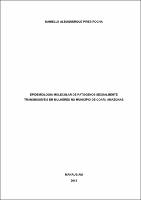| ???jsp.display-item.social.title??? |


|
Please use this identifier to cite or link to this item:
https://tede.ufam.edu.br/handle/tede/4300| ???metadata.dc.type???: | Tese |
| Title: | Epidemiologia molecular de patógenos sexualmente transmissíveis em mulheres no município de Coari, Amazonas. |
| ???metadata.dc.creator???: | Rocha, Danielle Albuquerque Pires  |
| ???metadata.dc.contributor.advisor1???: | Santos, Cristina Maria Borborema dos |
| ???metadata.dc.description.resumo???: | A falta de precisão e rapidez no diagnóstico laboratorial de algumas doenças sexualmente transmissíveis (DST) são problemas enfrentados pelos profissionais que atuam nesta área. Além dessas dificuldades inerentes aos testes, a falta de alguns deles na rede pública de saúde dificultam ainda mais a elucidação de diagnósticos. Por causa dessas dificuldades, as DST são subdiagnosticadas, sendo tratadas indiscriminadamente, valendo-se apenas do diagnóstico clínico. Os métodos moleculares de diagnóstico têm surgidos nos últimos anos como uma excelente alternativa para preencher algumas dessas lacunas deixadas pelos métodos tradicionais. Esta pesquisa teve como finalidade estudar a epidemiologia de alguns patógenos sexualmente transmissíveis a nível molecular, valendo-se para isso de técnicas de biologia molecular, em mulheres atendidas na Atenção Primária à Saúde do Município de Coari, Amazonas (AM). Foram colhidas amostras cervicais de 361 mulheres para exame citológico (Papanicolaou) e exame molecular. Foi realizado o diagnóstico molecular através da técnica de Reação em Cadeia da Polimerase (PCR) e PCR em tempo real para alguns patógenos sexualmente transmissíveis, que foram: Papilomavírus Humano, Herpes Vírus Simples 2, Citomegalovírus Humano, Chlamydia trachomatis, Neisseria gonorrhoeae e Trichomonas vaginalis. Os resultados obtidos mostraram que 47,8% dessas mulheres estavam infectadas por algum dos patógenos estudados. Constatou-se alta prevalência de infecção por Papilomavírus Humano (29,1%), seguida pelo T. vaginalis (12,7%), Citomegalovírus Humano (8,3%), C. trachomatis (6,4%), N. gonorrhoeae (1,4%) e Herpes vírus Simples 2 (0,6%). O tipo prevalente de HPV nas mulheres infectadas foi o HPV 16 (58,1%), seguido pelo HPV 58 (20,0%). As lâminas citológicas satisfatórias para diagnóstico (n=321) mostraram que 7 mulheres (2,1%) exibiram alterações citológicas (ASCUS, LSIL e HSIL), estando 5 delas contaminadas pelo HPV. Não foram encontradas associações estatisticamente significativas entre as infecções por patógenos sexualmente transmissíveis e variáveis relacionadas à condições sócio-demográficas, história clínica e comportamento sexual. |
| Abstract: | The lack of precision and speed in the laboratory diagnosis of some sexually transmitted infections (STI) are commom problems faced by professionals working in this area. Additionally, the lack of some of them in the public health system become more difficult to elucidate the diagnosis. Because of these difficulties, the STI are underdiagnosed, being treated indiscriminately, using only clinical diagnosis. The molecular diagnostic methods have arisen in recent years as an excellent alternative to fill some of the gaps left by traditional methods. The aim of this research was to study the epidemiology of some sexually transmitted pathogens at molecular level, using molecular biology techniques in women attended in public health system in the city of Coari, Amazonas, Brazil. Samples were collected from 361 women for cervical cytology (Pap Smear) and molecular examination. We carried out molecular diagnosis using the technique of Polymerase Chain Reaction (PCR) and real-time PCR for some sexually transmitted pathogens, which were: Human Papillomavirus, Herpes Simplex Virus 2, Human Cytomegalovirus, Chlamydia trachomatis, Neisseria gonorrhoeae and Thichomonas vaginalis. The results showed that 47.8% of these women were infected by any of the pathogens. There was a high prevalence of infection with Human Papilomavirus (29.1%), followed by T. vaginalis (12.7%), Human Cytomegalovirus (8.3%), C. trachomatis (6.4%), N. gonorrhoeae (1.4%) and Herpes Simplex Vírus 2 (0.6%). The prevalence of HPV type in the infected women was HPV 16 (58.1%), followed by HPV 58 (20.0%). The satisfactory slides for cytological diagnosis (n=321) showed that 7 women (2.1%) showed abnormal cytology (ASCUS, LSIL and HSIL), 5 of them being infected by HPV. There were no statistically significant associations between sexually transmitted infections and the variables related to socio-demographics, medical history and sexual behavior. |
| Keywords: | Doenças sexualmente transmissíveis (DST) Diagnóstico molecular Coari - Amazonas Reação em Cadeia da Polimerase (PCR) Sexually Transmitted Infections (STI) Molecular Diagnosis Polymerase Chain Reaction (PCR) |
| ???metadata.dc.subject.cnpq???: | CIÊNCIAS BIOLÓGICAS |
| Language: | por |
| ???metadata.dc.publisher.country???: | Brasil |
| Publisher: | Universidade Federal do Amazonas |
| ???metadata.dc.publisher.initials???: | UFAM |
| ???metadata.dc.publisher.department???: | Instituto de Ciências Biológicas |
| ???metadata.dc.publisher.program???: | Programa de Pós-Graduação em Biotecnologia |
| Citation: | ROCHA, Danielle Albuquerque Pires. Epidemiologia molecular de patógenos sexualmente transmissíveis em mulheres no município de Coari, Amazonas. 2012. 170f. Tese (Doutorado em Biotecnologia) - Universidade Federal do Amazonas, Manaus, 2012. |
| ???metadata.dc.rights???: | Acesso Aberto |
| URI: | http://tede.ufam.edu.br/handle/tede/4300 |
| Issue Date: | 25-Jun-2012 |
| Appears in Collections: | Doutorado em Biotecnologia |
Files in This Item:
| File | Description | Size | Format | |
|---|---|---|---|---|
| Danielle Albuquerque Pires Rocha.pdf | Danielle Albuquerque Pires Rocha.pdf | 1.6 MB | Adobe PDF |  Download/Open Preview |
Items in DSpace are protected by copyright, with all rights reserved, unless otherwise indicated.




